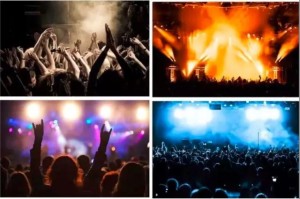Author:Date:2019-10-25

Series of fires indicate that
Stage lighting fire protection design is very important.
Then, how to design stage lighting fire protection
Can I be qualified as a fire safety inspection?
Reasonable selection of lamp types
In explosion-prone mixtures or where it is prone to generate explosive media, an integral explosion-proof device should be used. For corrosive gases and particularly humid places, sealed or moisture-proof luminaires should be used, and the components should be treated with anti-corrosion treatment. Floodlights can be used in hot and dusty places (such as steelmaking, iron making, steel rolling, etc.). Outdoor lighting can be enclosed lamps or open lamps with fire lamp holders.
Lighting and decorative lighting should be properly installed
(1) The distance between the lamps and the combustibles shall not be less than 50 cm (the tungsten halogen lamps shall be greater than 50 cm), and the height of the ground shall not be less than 2 m. When the height is lower than this, protective equipment shall be installed. It is not advisable to stack combustible items under the bulb.
(2) The protective cover of the luminaire must be intact. It is strictly forbidden to cover the luminaire with paper, cloth or other combustible materials.
(3) The power of all concealed and surface mounted lamps on the flammable ceiling should not be too large, and should be dominated by incandescent lamps or fluorescent lamps. The surrounding lamps and their heating accessories should have good heat dissipation conditions around them. The wires of the stage concealed lanterns, the dance floor lamps and the lamps in the flammable ceiling shall be laid with steel pipes or flame-retardant hard plastic casings; the wires near the tungsten halogen lamps shall be made of heat-resistant insulating sheaths; the wires for hoisting lanterns shall be used. There should be a rubber ring protection through the keel.
(4) The use of low-quality ballasts with reliable quality is not allowed to directly fix the ballasts with high temperature rise on objects such as combustible large plates. The capacitance and capacity must be consistent with the lamps.
(5) Class 0 and Class 10 explosion hazardous places (0-level zone refers to explosive gas, and zone 10 refers to explosive dust). When the open-type lamp is used to make the wall-mounted alcove, the access door should be outside the wall. Open and ensure good ventilation; the side that is illuminated indoors should be sealed with double glazing. The horizontal distance from the door and the window frame is not less than 3 meters, and the horizontal distance from the air outlet is not less than 5 meters.
Reasonable control of electrical lighting
The lighting currents should each have their own branch circuit and should not be connected after the main power switch. Short circuit protection facilities shall be provided for each branch circuit. In order to avoid accidents caused by overload and heat, some important places and inflammable and explosive materials must also be equipped with overload protection devices. Non-explosion-proof lighting distribution boxes and control switches are strictly forbidden to be used in Class 0 and Class 10 explosion hazardous areas. Minimize the joints after the switchboard, and the disk surface should be well grounded.
Strict lighting voltage level and load
The lighting voltage is generally 220 volts, the supply voltage of portable lighting fixtures should not exceed 36 volts, and in wet areas should not exceed 12 volts, and autotransformers are prohibited. Power outlets below 36 volts and above 220 volts should be clearly marked and marked.
The number of lamps in a branch circuit should not exceed 20, the civil lighting current should be less than 15 amps, and the industrial use should be less than 20 amps. The wire size is determined by the amount of load (each socket is measured with a load of 2 to 3 amps). The three-phase four-wire lighting circuit should also be balanced with three-phase load.
Accident lighting fixtures should be located in places prone to accidents, major entrances and exits of buildings, important workplaces, etc., and marked with obvious color markings for timely and convenient activation. Accident lighting fixtures cannot be of a slow start type (such as ballast starters, etc.). Accident lighting fixtures should be powered by an independent emergency battery to ensure that the normal power system is properly opened when it is damaged.
↓Next [ laser safety ]








